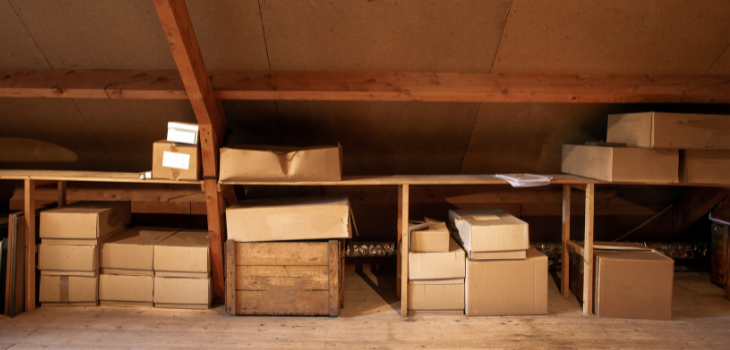
Attic Storage Ideas: 20 Tips for Efficient Attic Organization
Attic storage can be a game-changer when it comes to maximizing space in your home. However, without proper organization, attics can quickly become cluttered and chaotic. From clever storage solutions to insulation considerations, we've got you covered. Take a look a our list of 20 attic storage ideas to help your attic organization plans.
20 Attic Storage Ideas for Maximizing Organization
Assess your attic space: Before diving into organizing your attic, assess the available space. Take note of the dimensions, the height of the attic truss, and any obstacles that might affect storage. This information will guide your organization plan.Install sturdy flooring: One of the first steps in preparing your attic for storage is to install a sturdy floor. Use plywood or similar materials to create a solid and even surface that can support the weight of your stored items.
Utilize an attic truss: An attic truss often have built-in space between them, providing additional storage opportunities. Install shelves or racks between the trusses to maximize this unused space efficiently.
Consider built-in cabinets and shelving: To make the most of your attic's vertical space, install built-in cabinets and shelving. Customized storage solutions can help you optimize every nook and cranny.

Label and categorize: When storing items in your attic, be sure to label boxes and categorize them based on their contents. This will make it easier to locate specific items when needed, saving you time and effort.
Use clear storage containers: Opt for clear plastic storage containers instead of cardboard boxes. Transparent containers allow you to see the contents at a glance, eliminating the need to open multiple boxes to find what you're looking for.
Properly insulate your attic: Insulating your attic is crucial for maintaining a controlled temperature and protecting your attic storage. Consider using spray foam insulation, as it offers excellent coverage and can be applied even in hard-to-reach areas.
Create a separate storage zone: Designate a specific area in your attic for long-term storage, where you can keep items that are less frequently used. This way, you can prioritize access to more frequently needed items in a separate zone.
Utilize under-eave storage: The space under the eaves can be utilized effectively for storage. Install shelves, hooks, or hanging rods to make the most of this often underutilized area.
Avoid storing certain items: While the attic storage provides extra space, there are items you should avoid storing there. Keep perishable items, electronics, and delicate belongings away from the attic, as temperature fluctuations and potential moisture can damage them.
Properly pack fragile items: For fragile items that need to be stored in the attic, pack them with care. Wrap delicate items in bubble wrap, use appropriate padding, and stack them safely to prevent any damage.
Insulate attic walls and floors: To maintain a comfortable living environment below the attic, it's best to insulate the walls and floors. This will help prevent heat loss and reduce energy consumption.

Use vacuum-sealed bags: To save space and protect your belongings, consider using vacuum-sealed bags for items like clothing, bedding, or pillows. These bags remove excess air, reducing the volume of stored items.
Create a labeling system: In addition to labeling boxes, establish a labeling system for individual items or sections within your attic. This system will further streamline your organization process and make retrieval easier.
Install proper lighting: Make your attic more accessible by installing adequate lighting. This will help you navigate through your storage space and locate items with ease.
Install a pulley system: If your attic has high ceilings, consider installing a pulley system to lift heavy or bulky items. This makes it easier to transport and store larger objects without straining yourself.
Incorporate hanging storage: Maximize vertical space by installing hooks, racks, or hanging rods to store items such as bicycles, sports equipment, or holiday decorations. This keeps them off the floor and creates more usable space.
Utilize stackable storage bins: Stackable storage bins are a great solution for attics with limited floor space. Opt for bins with interlocking lids to secure your belongings and prevent dust or pests from getting in.
Install a folding attic ladder: Make accessing your attic a breeze by installing a folding attic ladder. This convenient addition allows you to easily reach your attic storage space and can be folded away when not in use.
Regularly declutter and maintain: Lastly, to ensure long-term efficiency in your attic organization, make it a habit to regularly declutter and maintain the space. Periodically go through your stored items, donate or discard what you no longer need, and reorganize as necessary.

How Can I Make My Attic Usable for Storage with Attic Storage Ideas and Organization?
Transforming your attic storage space requires effective organization and smart utilization of available room. Begin by decluttering and eliminating items you no longer need or use, creating a well-organized attic space.
Optimize the area by installing sturdy flooring like plywood or attic floorboards. Reinforce the floor if needed to support bulky items. Install a reliable access ladder or stairs for easy entry and retrieval, ensuring safety by adding handrails.
Organize the attic by categorizing similar items and using labeled boxes, storage bins, or shelves. Maximize vertical space with hooks or racks for tools, clothing, or sports equipment. Clear plastic bins make it easy to identify smaller items.
Improve lighting with windows, skylights, or proper overhead lighting to ensure visibility while accessing stored items. By following these practical attic storage ideas, you can create a functional and organized storage space in your attic.

How do you Insulate an Attic for Storage and Maintain its Functionality?
When insulating your attic while preserving its storage functionality, it's essential to choose the right insulation materials and techniques. Opt for insulation types that are suitable for storage areas and ensure they meet safety standards. Fiberglass batts and rigid foam insulation are commonly used options in attic insulation projects.
Instead of insulating the attic floor, focus on insulating the roofline. This approach provides numerous benefits. Insulating the roofline helps regulate temperatures within the attic, safeguarding your stored items from extreme heat or cold. It also prevents compression of the insulation, maintaining its effectiveness over time.
Insulating the roofline also offers advantages in terms of energy efficiency. By preventing heat transfer between the attic and the rest of the house, you can reduce energy consumption and lower heating or cooling costs. This approach is especially beneficial if your attic contains sensitive items that require a stable and moderate climate.

What Should you Avoid Storing in your Attic?
While the attic storage is valuable, certain items should be kept away due to potential damage or safety concerns. Avoid storing temperature-sensitive belongings such as electronics, photographs, or artwork. Extreme temperatures and humidity fluctuations in the attic can cause irreparable harm to these delicate items.
It's best to avoid storing valuable possessions, important documents, or sentimental items in the attic as well. Instead, choose a more secure and controlled environment such as a locked cabinet or safe for such items.
Is it Better to Insulate the Attic Ceiling or Floor for Storage Purposes?
In terms of storage purposes, it is generally more effective to insulate the attic ceiling rather than the floor. Insulating the ceiling below the attic is a widely recommended approach as it helps maintain consistent temperatures throughout your living spaces.
Insulating the attic ceiling prevents heat from escaping the rooms below, improving energy efficiency and reducing heating or cooling expenses. It also lightens the load on your HVAC systems, leading to potential energy savings.
Related Blog Posts
- Revive Your Home for Spring with This Spring Home Maintenance Checklist
- 10 New Home Trends That Will Make Your Friends Jealous
- How Our Dumpsters Support Realtors and Property Managers: A Comprehensive Guide
- 12 Jaw-Dropping Clutter Statistics That Will Make You Want to Declutter Today!
- Unlocking Space: The Complete Guide on Pocket Door Installation
- Step by Step Guide on How to Install Carpet Like a Pro



